Get Started today
Get Started today

Learn Industry based
FASHION BUYING
AND
MERCHANDISING
The essential skills & knowledge to thrive
in the dynamic retail buying office
Learn Industry based
FASHION BUYING
AND
MERCHANDISING
The essential skills & knowledge to thrive
in the dynamic retail buying office

Get ready to
Get ready to deliver amazing products to the retail floor?
This online course is your golden ticket to success!
Step into the dynamic world of fashion buying
This Online Course Is Your Golden Ticket To Success!
Learn All You Need To Know To Become A GREAT Fashion Buyer
Are you dreaming of a career in fashion buying
but don't know where to start??
Dont' Worry !! You have come to the right place...
Do you think about this .....
You know the theory but lack practical knowledge
about how to take a fashion product from concept to retail
You feel overwhelmed by the complex workings of the fashion industry, and
struggle to understand how to navigate the industry effectively.
You want to understand fashion buying product development, sourcing, pricing, and
merchandising strategies but don't know who to ask
You struggle not knowing how to predict what styles a
and how to incorporate trends into effective buying decisions.
Does this sound familiar..? If so, then the next few paragraphs will be well worth reading ..... 👀
start today • don't miss out!
start today • don't miss out!
start today • don't miss out!
start today • don't miss out!
start today • don't miss out!
Are you dreaming of a career in fashion buying
but don't know where to start??
You’ve come to the right place,.
Does this sound familiar to you…?
You know the theory but lack practical knowledge about how to take a fashion product from concept to retail
You feel overwhelmed by the complex workings of the fashion industry, and struggle
to understand how to navigate the industry effectively.
You want to understand fashion buying product development, sourcing, pricing, and
merchandising strategies but don't know who to ask
You struggle not knowing how to predict styles and how to incorporate trends into effective buying decisions.
If this hit home, the next few paragraphs will
be well worth the read 👀

Working as a fashion buyer is one of the most exciting, challenging and sought after careers in fashion. Behind the glamorous image of a buyer lies a world of hard work, dedication, and resilience.
Here is a reality check :
The buyer is responsible for ordering products sold in stores to ensure maximum profit.
Getting a job in fashion is hard, mostly because it is a very competitive industry,
In this demanding role you’ll need to be constantly trend spotting, have a strong business sense and be a great communicator.
if you want to get noticed and stand out you need to know what to do from day one and do what others don't
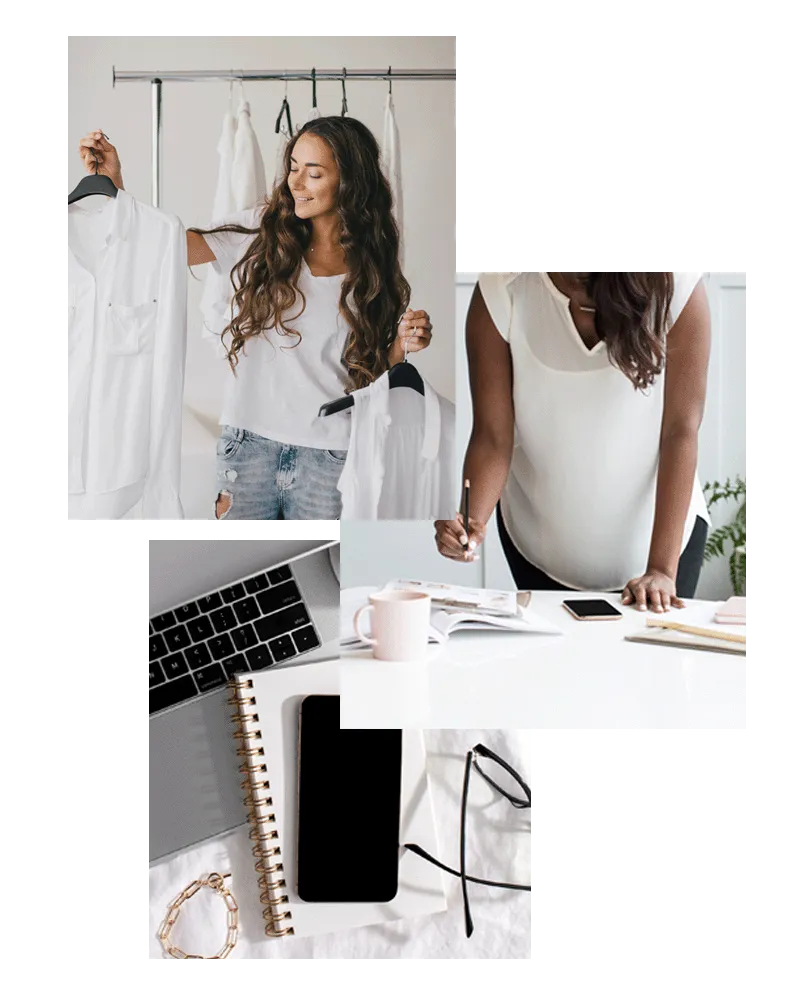

Working as a fashion buyer is one of the most exciting, challenging and sought after careers in fashion. Behind the glamorous image of a buyer lies a world of hard work, dedication, and resilience.
Here is a reality check :
The buyer is responsible for ordering products sold in stores to ensure maximum profit.
Getting a job in fashion is hard, mostly because it is a very competitive industry,
In this demanding role you’ll need to be constantly trend spotting, have a strong business sense and be a great communicator.
if you want to get noticed and stand out you need to know what to do from day one and do what others don't
Most people assume they have the skills they need to work in a retail buying office
Most people assume they have the skills they need to work in a retail buying office

Having a nuanced eye, depth and breadth of historical information, and understanding the data behind the history is vital but only part of the story
Very few buyers know all of these things >>
Drafting a budget and Managing Open to Buy
Critical path planning and using previous sales history in context with the products
Supplier strengths, weaknesses, lead times and production capacity and delivery scheduling
knowledge and understanding of buying math and supply chain issues involved
Discover the REAL skills you need to thrive as a fashion buyer in the industry—beyond what college can teach

Having a nuanced eye, depth and breadth of historical information, and understanding the data behind the history is vital but only part of the story
Very few buyers know all of these things >>
Drafting a budget and Managing Open to Buy
Critical path planning and using previous sales history in context with the products
Supplier strengths, weaknesses, lead times and production capacity and delivery scheduling
knowledge and understanding of buying math and supply chain issues involved
Discover the REAL skills you need to thrive as a fashion buyer in the industry—beyond what college can teach
Learn all you need to know for your dream job as a fashion buyer & stand out in this competitive industry
Enroll in this practical hands on course for aspiring fashion professionals
Learn all you need to know for your dream job as a fashion buyer & stand out in this competitive industry
Enroll in this practical hands on course for aspiring fashion professionals
10,000+
product quantities
Budget
Planning for $120 million
Designer
Preparing trends & styles
Suppliers
Costing & Delivery
Have you thought about this..?
Knowing everything that is taught within this course and incorporating the lessons learnt into your buying role will allow you to embark on your fashion career with confidence, clarity, and foundational knowledge that will lay a path to success
This will provide the hands on specific training required for buyers in a retail buying office that need to know the steps, processes and timelines to develop product - This course is a step by step guide for each process of the buying cycle
Keeping up with ever-changing fashion trends is not enough - you need to develop your business skills & understanding of the role so you can progress successfully or you will struggle not knowing what will resonate with your consumers and how to make buying decisions effectively.
"Sometimes we don't know what we don't know "
By enrolling in the course today, you'll be learning from a true expert in the field who has a proven track record of success.
Unlock the insider secrets that will truly transform your career. The key is understanding and planning your fashion buying strategy
Take your fashion buying knowledge from theory to
industry-relevant and practical in just 3 months.
Be Productive and Confident from Day One
This is the foundation of consistent conversions day after day, a skill that sets you apart from common myths surrounding fashion buying education.
Learn What Google WON'T Teach You
Discover the truth that most courses overlook — the power of strategy for sustainable success. Most fashion buying courses shy away from this crucial aspect, assuming everyone should already know.
Hope is Not a Career Strategy
Embark on this step-by-step, on-demand training that guides you through mastering the intricacies of fashion buying settings. Elevate your career by ensuring your settings are up-to-date, preparing your account to thrive in the world of fashion buying.

Introducing

Fashion Buying & Merchandising
Introducing

Fashion Buying & Merchandising
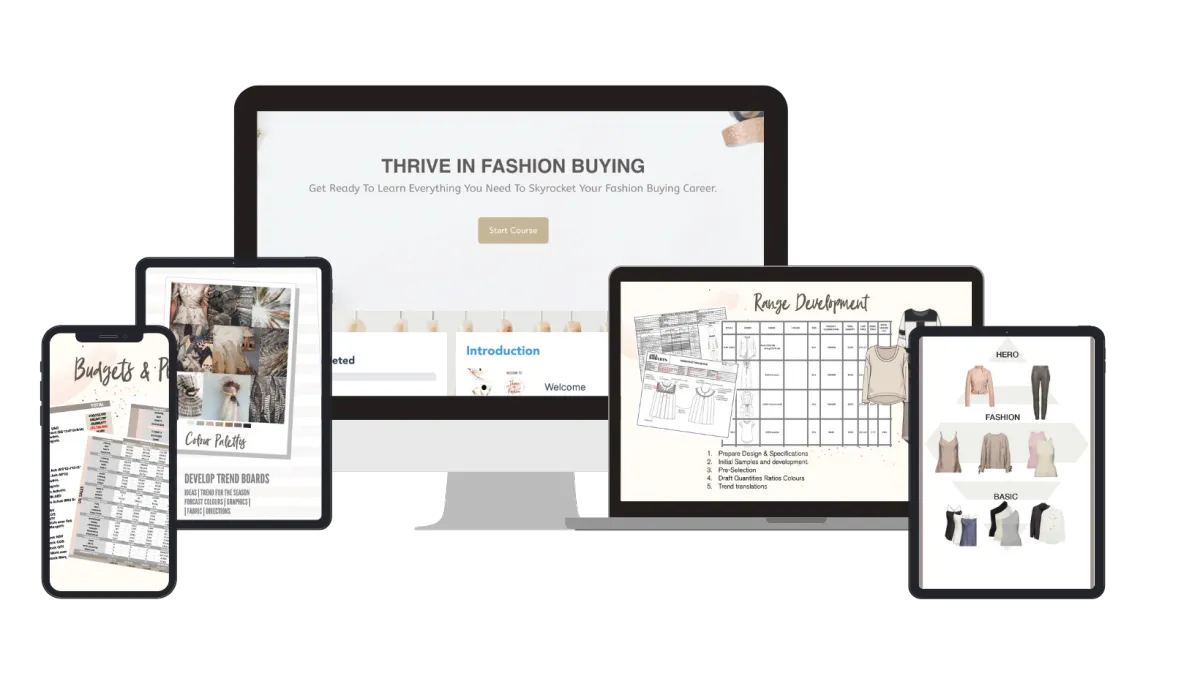
Enroll in this Industry Insiders course for aspiring fashion Buying professionals:
Fashion Buying & Merchandising requires strategic planning, buying, and selling of fashion products.The primary objective is to ensure the right products are available in the right quantities, at the right time, and at the right place.
Easier said than done !!
There are 10 modules in the course that you can move through at your own pace.
Each module is clear and jam-packed with videos.
Each video covers a learning step and you can work through them as fast or as
slow as you like! You will learn how to develop an understanding of consumer behaviour, trends,
and finance and budgeting and develop effective pricing strategies and commercial range plans
to maximise sales.
Learn however you want to and feel most comfortable Listen and
watch the videos and take notes you go. Have fun learning!
Get the buying strategy from concept to consumer

Enroll in this Industry Insiders course for aspiring fashion Buying professionals:
Fashion Buying & Merchandising requires strategic planning, buying, and selling of fashion products.The primary objective is to ensure the right products are available in the right quantities, at the right time, and at the right place.
Easier said than done !!
There are 10 modules in the course that you can move through at your own pace.
Each module is clear and jam-packed with videos.
Each video covers a learning step and you can work through them as fast or as slow as you like! You will learn how to develop an understanding of consumer behaviour, trends,
and finance and budgeting and develop effective pricing strategies and commercial range plans
to maximise sales.
Learn however you want to and feel most comfortable Listen and watch the videos and take notes you go. Have fun learning!
Get the buying strategy from concept to consumer
the course
CONTENTS
Inside the course
CONTENTS
INSIDE THE COURSE

MODULE 1
The Buying Cycle
This module focuses on the big picture view explaining the buying calendar, the critical path and how to manage it; the stages of the buying cycle and ways of working and best practise industry methods followed by retail brands. There are workbooks, checklists and templates included to download and modify according to your key dates.

MODULE 2
Fashion Buying Fundamentals
Fashion Buying is challenging, competitive and tough at all levels. It is important to understand all the moving parts. What are the skills you need to develop and what is required to get to the next level of your career as a fashion buyer
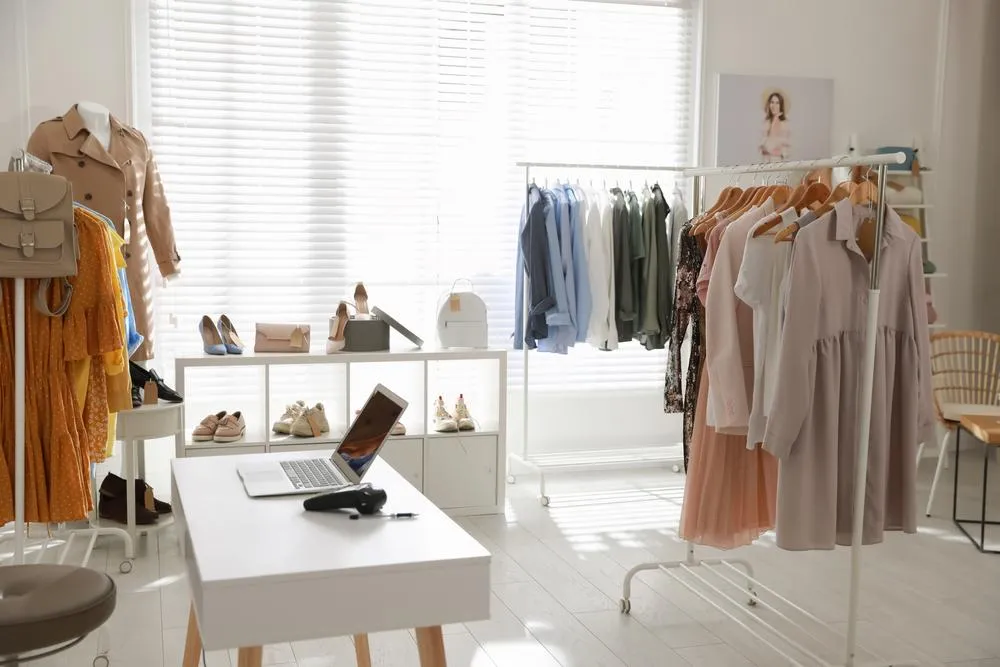
MODULE 3
Trends, Textiles & Trade Shows
In this module we delve into the purpose of trends and market research and how it applies to your customer and target market. The buyer's role is to bring new ideas and products to your customers.This involves many decisions and choices weeks or months in advance that need to be business right.
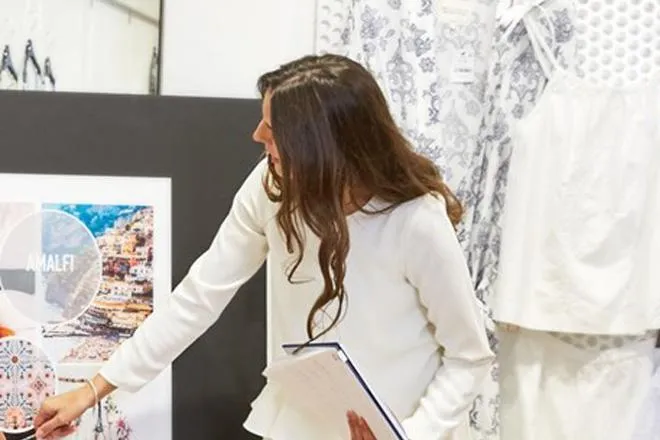
MODULE 4
Concept & Product Development
This module explains the product development process. What you need to consider when building the range, how different styles and colours work together and how to manage the whole process effectively avoiding common pitfalls going from concept to confirmed order.

MODULE 5
Merchandise Planning & Buying
In this module we follow the various stages the buyer goes though before finalising the range understanding variety, depth, price and availability. We look at planning stock intakes and how to understand the relationship between sales, stock levels and ordering quantities in order to build a commercial range plan.

MODULE 6
Retail Math Essentials
You don't need to have accountancy skills, but there are some basic calculations that all buyers should know and are required when costing products for profit. In these videos we break down the formulas used when preparing target prices and how to calculate cost prices.

MODULE 7
Budgets & Pricing Strategies
This module explains the various stages the buyer goes though before finalising the range taking into consideration variety, depth, price and availability. We look at the role of merchandising when planning stock intakes and how to understand the relationship between sales, stock levels and ordering quantities in order to build a commercial range plan.

MODULE 8
Building the Range Plan
The preparation of a range plan is vital to planning a collection. This covers how to build a plan that includes both trend-led and ‘core’ products, and avoiding duplication, what is a price point hierarchy and how to manage the lead times of each garment to ensure that the whole collection will be delivered on time.
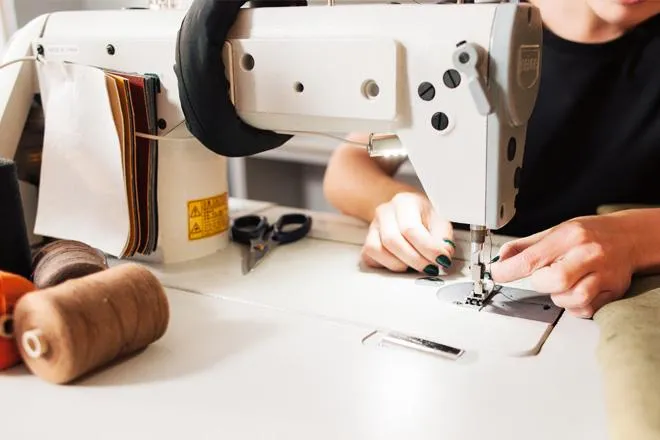
MODULE 9
Suppliers & Sourcing
This module is about working with suppliers so you can confidently communicate with them to give feedback on the development samples and manage the seasonal orders. We look at the questions to ask in meetings, how to work with minimum order quantities, prepare cross-costings and understand the lead times for the deliveries

MODULE 10
Sales Analysis & Management
In this module we look at sales and data reports and how to read and interpret them. What makes a best seller ? Why is sell-though important ? What happens if a product is not selling as planned or sells too quickly? We answer these questions and explain how to optimise the information available and to get a step ahead.

MODULE 0NE
THE BUYING CYCLE
This module focuses on the key aspects of the buyers role explaining the buying calendar, the critical path and how to manage it; the stages of the buying cycle and ways of working and best practise industry methods followed by retail brands. There are checklists and templates included to download and modify according to your key dates.
After this module you'll be able to ;
• Identify the key stages of the buying cycle & how it works
• Understand the importance of the critical path in buying and merchandising
• Tools for best practise to manage your daily tasks
• Plan your weekly schedule to prioritise time sensitive tasks
MODULE TWO
FASHION BUYING FUNDAMENTALS
Fashion Buying is challenging, competitive and tough at all levels. It is important to understand all the moving parts. Learn and practise the skills you need to develop and discover what is required to get to the next level of your career as a fashion buyer

After this module you'll be able to ;
• Understand the role and responsibilities of a fashion buyer and the buyers career path
• Identify the differences between a development buyer and a branded buyer
• Identify the skills needed to work as a fashion buyer and fashion merchandiser
• Understand how buyers collaborate with other departments

MODULE THREE
TRENDS TEXTILES & TRADE SHOWS
We delve into the purpose of trends and market research in this module and how it applies to your customer and target market. The buyer's role is to bring new ideas and products to your customers.This involves many decisions and choices weeks or months in advance that need to be business right.
After this module you'll be able to ;
• Understand the trend-translation process and its importance in range development
• Develop your knowledge about fabrics & textiles
• Identify the relevant Trade Shows for your category
• How to use the your market research effectively
MODULE FOUR
CONCEPT & PRODUCT DEVELOPMENT
The product development process has a lot of moving parts. This module will share all the steps you need to consider when building the range, how different styles and colours work together and how to manage the whole process effectively avoiding common pitfalls going from concept to confirmed order.

After this module you'll be able to ;
• Gain clarity on the different types of research and planning processes required to build a product range
• Understand the importance of extensive consumer and market research in order to understand your target consumer and their preferences
• Identify the different tools and methods used by buyers to prepare concepts
• Understand the importance of bottom-up information and how it is used when planning a product range

MODULE FIVE
MERCHANDISE PLANNING & BUYING
In this module you follow and learn the various stages the buyer goes though before finalising the range understanding variety, depth, price and availability. We look at planning stock intakes and how to understand the relationship between sales, stock levels and ordering quantities in order to build a commercial range plan.
After this module you'll be able to ;
• Review and analyse past seasons’ product ranges in the planning of future ranges
• Understand the sales data and what makes a good or slow selling line
• Identify the key components of building the range
• Critically assess your range to ensure its commerical viability
MODULE SIX
RETAIL MATH ESSENTIALS
You don't need to have accountancy skills, but all buyers should know the basic calculations when costing products for profit. In these videos we break down the formulas used when preparing target prices and how to calculate cost prices selling prices and margins.

After this module you'll be able to ;
• Confidently calculate your retail prices and margins
• Understand the key retail formulas required in buying and merchandising
• Discuss the negotiation process between buyers and suppliers, and
• Identify successful negotiation tactics

MODULE SEVEN
BUDGETS & BUYING STRATEGIES
Before finalising the range the buyer needs to review the assortment mix taking into consideration variety, depth, price and availability. In this module we learn the importance of merchandising when planning stock intakes and how to understand the relationship between sales, stock levels and ordering quantities in order to build a commercial range plan.
After this module you'll be able to ;
• Discuss the negotiation process between buyers and suppliers
• Understand how to conduct a range review in buying
• Plan your order placement according to your intake plan
• Prepare your orders for final confirmation
MODULE EIGHT
BUILDING THE RANGE PLAN
The preparation of a range plan is vital to planning a collection. This covers how to build a plan that includes both trend-led and ‘core’ products, and avoiding duplication, what is a price point hierarchy and how to manage the lead times of each garment to ensure that the whole collection will be delivered on time.

After this module you'll be able to ;
• Identify the key product characteristics and classifications
• Discuss the width and depth of a product range and how to reduce risk in range planning.
• Explain the purpose of the pre-selection meeting and final range review and sign off meetings
• Understand how to minimise risks in range planning.

MODULE NINE
SUPPLIERS AND SOURCING
This module is about working with suppliers so you can confidently communicate with them to give feedback on the development samples and manage the seasonal orders. We look at the questions to ask in meetings, how to work with minimum order quantities, prepare cross-costings and understand the lead times for the deliveries
After this module you'll be able to ;
• Understand the different types of sourcing from local to global sourcing
• Identify how buyers select and appraise suppliers to find the most suitable production facility
• Be clear on the importance of garment fitting and the importance of quality control
• Manage the critical path to monitor the production of garments
MODULE TEN
SALES ANALYSIS AND MANAGEMENT
In this final module we look at retail sales and data reports and how to read and interpret them.What makes a best seller? Why is sell-though important and What happens if a product is not selling as planned or sells too quickly? We answer these questions and explain how to optimise the information available and to get a step ahead.

After this module you'll be able to ;
• Identify the key formulas that help in sales forecasting, such as stock turn and week’s cover
• Confidently read your sales data reports and draw actionable conclusions
• Identify when items should be marked down in price or put on promotion
• Understand how monitor and react to product sales
Get Started Immediately today ....

comprehensive training on all aspects of
fashion buying.
Acquire the skills and knowledge needed to
excel in the Fashion industry.
confidently pursue Your dream career in
fashion buying & Merchandising
Learn industry Relevant training
best Practise and Application.
navigate Your career transition with
confidence & Support
I'm ready to join

comprehensive training on all aspects of fashion buying.
Acquire the skills and knowledge needed to excel in the Fashion industry.
confidently pursue Your dream career in fashion buying & Merchandising
Learn industry Relevant training best Practise and Application.
navigate Your career transition with confidence & Support
I'm ready to join

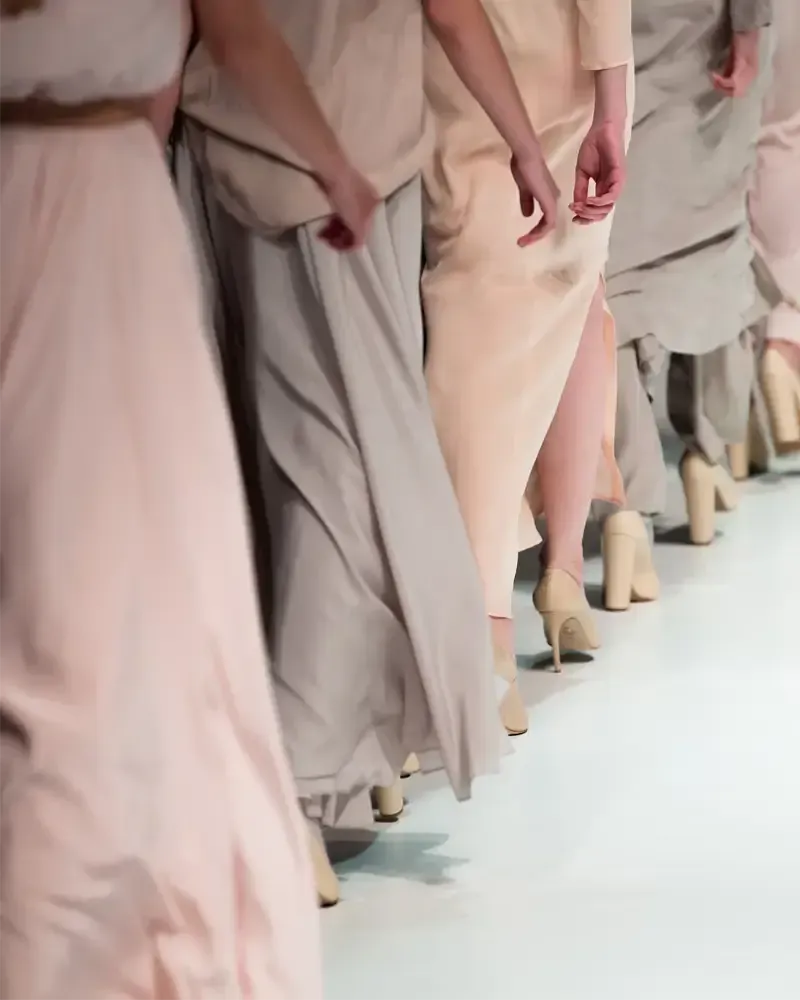
The Thrive in Fashion Buying and Merchandising course
brings everything together to boost your fashion buying knowledge and skills.
Learn everything you need to know to land your dream fashion buying job and get a step ahead in this competitive industry.
Especially if you don't have experience
Even if you do have a fashion degree
Or if you are coming from another industry
Maybe you are still studying or have graduated.
You can’t access this material anywhere else.
WHAT PEOPLE ARE SAYING
“Elisabeth is very talented, has so much expertise and is fully comitted to deliver exceptional results.”
She has lots of knowledge in Merchandise Planning, Buying and Retailing on fashion apparels. It was fantastic learning from her and I was able develop my skills and gained lots of global experience in fashion and retailing
M Lathief
WHAT PEOPLE ARE SAYING
“Elisabeth is very talented, has so much expertise and fully committed to deliver exceptional results ...”
She has lots of knowledge in Merchandise Planning, Buying and Retailing on fashion apparels. It was fantastic learning from her and I was able develop my skills and gained lots of global experience in fashion and retailing
M Lathief
join today, and start your fashion learning :
ALL YOURS WITH
ONE CLICK!
here’s how it goes:
When you sign up, you get immediate access.
Log in to the course in seconds, get familiar with
the module layout and hit play to start your first lesson
There are 10 modules in the course that you can move through at your
own pace.Each module is clear and jam-packed with videos. Each video
covers a learning step and you can work through them as fast or as
slow as you like! (P.S. No one will judge you if you binge-watch
everything at once!)
Learn however you want to learn. Listen and
watch the videos and take notes you go. Have fun learning!
join today and start learning :
ALL YOURS WITH
ONE CLICK!
here’s how it goes:
When you sign up, you get immediate access.
Log in to the course in seconds, get familiar with
the module layout and hit play to start your first lesson
There are 10 modules in the course that you can move through at your
own pace.Each module is clear and jam-packed with videos. Each video
covers a learning step and you can work through them as fast or as
slow as you like! (P.S. No one will judge you if you binge-watch
everything at once!)
Learn however you want to learn. Listen and
watch the videos and take notes you go. Have fun learning!

I'm Elisabeth Mac Hale
Course creator with over 25 years of industry experience
After studying fashion design and working across many areas of the fashion industry from apparel design, fashion buying & sourcing to brand and product development. I created this course in fashion buying and merchandising to help and guide those wanting to break into fashion buying and learn how to do things the 'right' way.
I remember my first design job in the industry after graduation and realised how unprepared I was for the reality of the industry and how much I needed to learn
Fast forward to today and I still see a huge gap between in knowledge and skillset for graduates starting our and professionals looking to transition to a fashion buying role.
I know what it takes to develop great buyers and this course teaches you everything you need to get started. Whatever your vision is for your career, I can teach you the Fashion Buying skills and work methods to deliver from concept to product to the shop floor.

I'm Elisabeth Mac Hale
Course creator with over 25 years of industry experience
After studying fashion design and working across many areas of the fashion industry from apparel design, fashion buying & sourcing to brand and product development. I created this course in fashion buying and merchandising to help and guide those wanting to break into fashion buying and learn how to do things the 'right' way.
I remember my first design job in the industry after graduation and realised how unprepared I was for the reality of the industry and how much I needed to learn
Fast forward to today and I still see a huge gap between in knowledge and skillset for graduates starting our and professionals looking to transition to a fashion buying role.
I know what it takes to develop great buyers and this course teaches you everything you need to get started. Whatever your vision is for your career, I can teach you the Fashion Buying skills and work methods to deliver from concept to product to the shop floor.
FREQUENTLY ASKED QUESTIONS
Here are a few answers to the most common questions.
WHAT IS REQUIRED TO DO THIS PROGRAMME?
Enrolled Candidates will need:A device with an internet connection (a laptop, computer or tablet will work best A way to view PDF and JPG downloads - most modern smartphones should allow this.
WHEN DOES THE COURSE START AND FINISH?
Access to the entire Thrive in Fashion Programme is given as the enrollment process is completed. Make sure to register below when the doors open for launch
HOW IS THE COURSE DELIVERED?
Lessons are delivered online and comprised of videos tutorials, worksheets and easy-to-follow written instructions.
HOW LONG IS THE ACCESS TO THE COURSE?
For the duration of the subscription
WHAT IF THE LOG-ON DOESN'T WORK ?
Log on Details are sent directly to the registered candidate. In case of a problem, this can be resolved by sending an email to [email protected]
STILL HAVE QUESTIONS?
Please email any questions you may have so you can determine if this course is right for your business Email [email protected]
Ready to take your fashion buying career to new heights?
Thrive in Fashion Buying' & merchandising is your ladder to success.
Enroll now and reshape your future
Thrive in Fashion Buying' & merchandising is your ladder to success. Enroll now and reshape your future
ENROLL TODAY ...
and get immediate access to this signature course

The Fashion Buying & Merchandising Programme
✓ 10 Modules with 70 + Video Lessons
✓ Done-for-You Templates
✓ Tons of Examples & Visual Content
✓ Download the PDF printables
ENROLL TODAY ...
and get immediate access
to this signature course

Fashion Buying & Merchandising Programme
✓ 10 Modules with 70 + Video Lessons
✓ Done-for-You Templates
✓ Tons of Examples & Visual Content
✓ Download the PDF printables
SPLIT PAY
THREE PAYMENTS OF
$299 USD
BIGGEST SAVING
ONE PAYMENT OF
$789 USD
SPLIT PAY
THREE PAYMENTS OF
$299 USD
BIGGEST SAVING
ONE PAYMENT OF
$789 USD
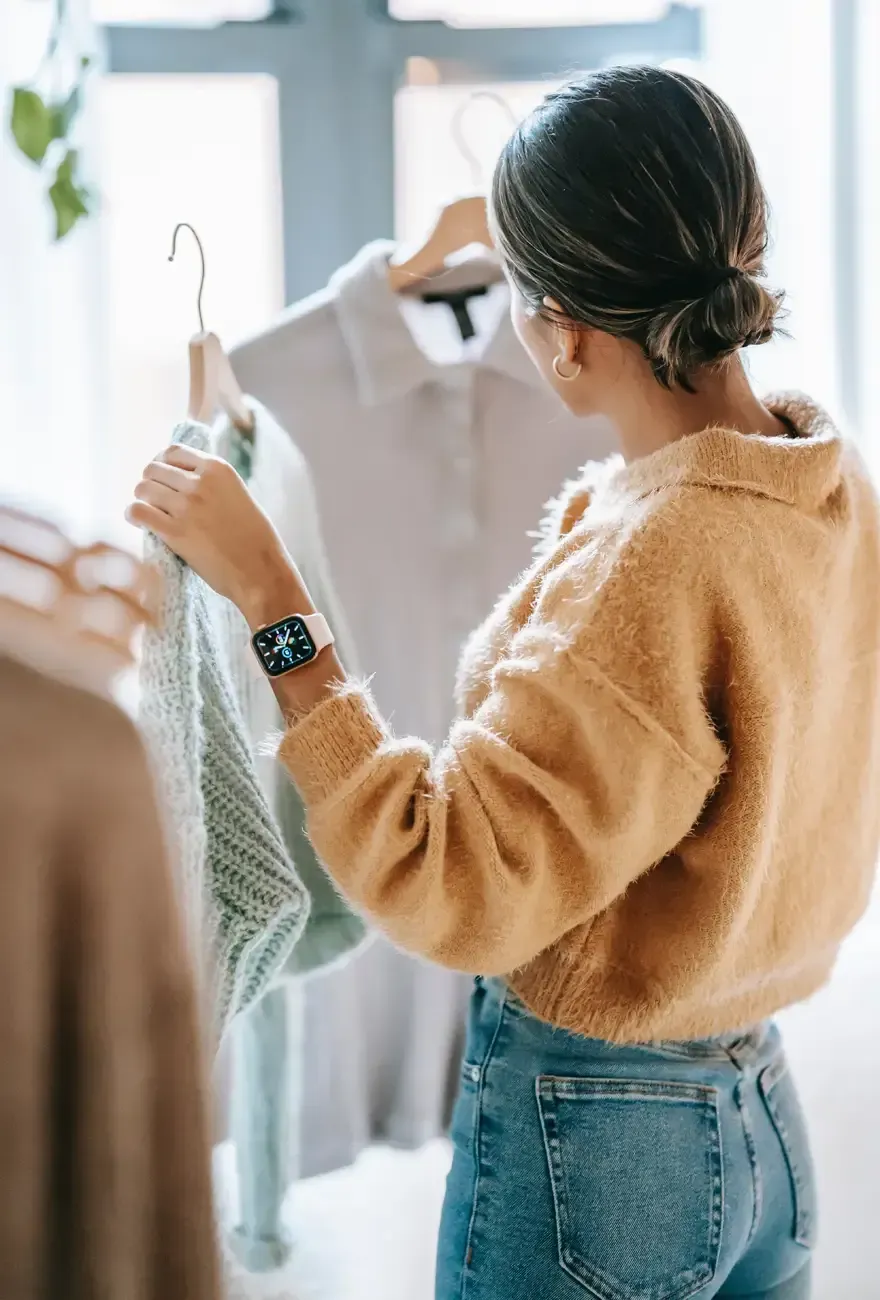
don't miss your chance
This valuable experience will help you to...
Develop and understand the skills required for a buyers role
Help you comprehend the changing environment that all buyers deal with it
Explain the decision making process for selecting one product instead of the other
Understand data analysis and forecasting trends
By taking this course they will be more prepared than many other junior buyers in the industry, giving you the advantage you need to advance in a challenging and competitive industry.

© Copyright 2024 THE DESIGN DIRECTIVE FZE |ALL RIGHTS RESERVED
PRIVACY POLICY | TERMS & CONDITIONS